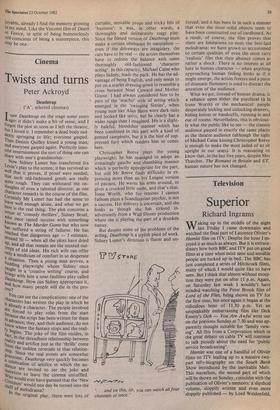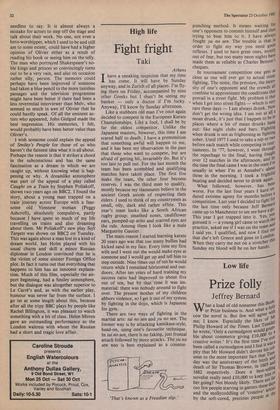Television
Superior
Richard Ingrams
Waking up in the middle of the night last Friday I came downstairs and watched the final part of Laurence Olivier's Hamlet film on ITV. Despite the hour I en- joyed it as much as always. But it is extraor- dinary how both BBC and ITV put on good films at a time when most sane and sensible people are tucked up in bed. The BBC has just completed a series of Hitchcock films, many of which I would quite like to have seen. But I think that almost without excep- tion they were put on after 11 p.m. Again, on Saturday last week I wouldn't have minded watching the Peter Brook film of Lord of the Flies, being shown on TV for the first time, but once again it began at the ridiculous hour of 11.30 p.m. Yet an unspeakably embarrassing film like Dick Emery's Ooh — You Are Awful went out on the previous Sunday at 7.30 and was ap- parently thought suitable for 'family view- ing'. All this from a Corporation which in the great debate on cable TV will continue to talk piously about the need for 'public service broadcasting'.
Hamlet was one of a handful of Olivier films on ITV leading up to a massive two- part tel!y-biography on the South Bank Show introduced by the inevitable Melv. This marathon, the second part of which will be shown on Sunday, coincides with the publication of Olivier's memoirs: a slipshod volume, sloppily written and even more sloppily published — by Lord Weidenfeld,
needless to say. It is almost always a mistake for actors to step off the stage and talk about their work. No one, not even a hero-worshipper, which I used to be and still am to some extent, could have had a higher opinion of Olivier either as a result of reading his book or seeing him on the telly. The man who portrayed Shakespeare's no- ble kings and princes so convincingly turns out to be a very vain, and also on occasion rather silly, person. The memoirs could perhaps have been improved if someone had taken a blue pencil to the more tasteless passages and the television programme might have been better if there had been a less reverential interviewer than Melv, who seemed so much in awe of Olivier that he could hardly speak. Of all the eminent ac- tors who appeared, John Gielgud made the best impression. His memories, I felt, would probably have been better value than Olivier's.
I wish someone could explain the appeal of Smiley's People for those of us who haven't the faintest idea what it is all about. Perhaps the reason is that it strikes a chord in the subconscious and has the same fascination as a dream in which we are caught up, without knowing what is hap- pening or why. A dreamlike atmosphere was part of the appeal of a play called Caught on a Train by Stephen Poliakoff, shown two years ago on BBC2. I found the story, about a young man trapped on a train journey across Europe with a fear- some old Viennese woman (Peggy Ashcroft), absolutely compulsive, partly because I have spent so much of my life travelling on trains and also dreaming about them. Mr Poliakoff s new play Soft Targets was shown on BBC2 on Tuesday. This was again about a man lost in a kind of dream world. Ian Holm played with his usual charm and skill a minor Russian diplomat in London convinced that he is the victim of some sinister Foreign Office plot. In fact it turns out that everything that happens to him has an innocent explana- tion. Much of this film, especially the air- port beginning, had a Smiley atmosphere, but the dialogue was altogether superior to Le Carre's and, as with the earlier play, humour was never far from the surface. I go on at some length about this, because after all the tripy BBC plays by people like Rachel Billington, it was pleasant to watch something with a bit of class. Helen Mirren gave an outstanding performance as the London waitress with whom the Russian had a short and tragic love affair.











































 Previous page
Previous page